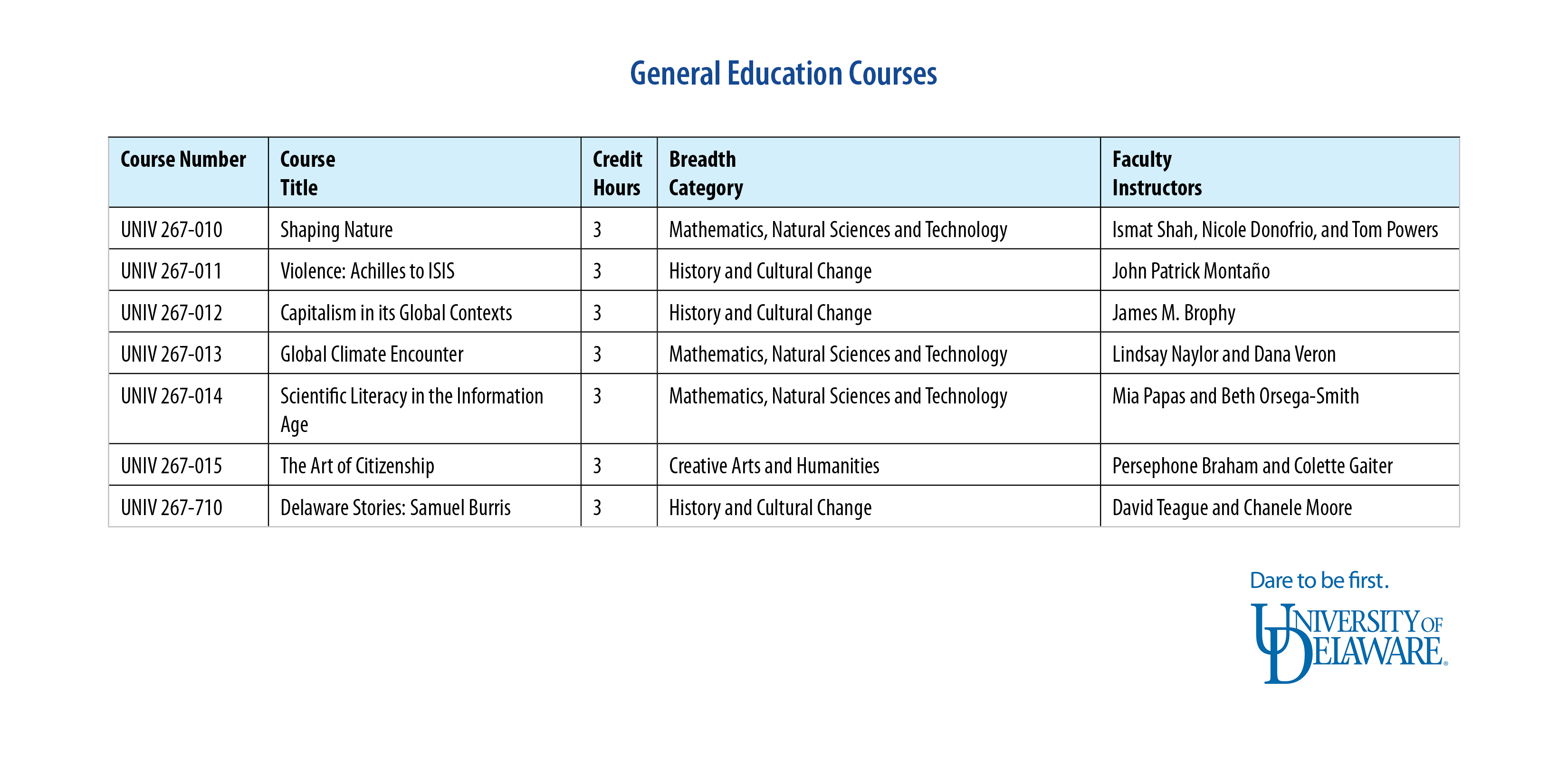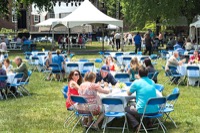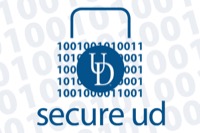
General Education core courses
UD students can now enroll in General Education core courses piloted for next fall
8:38 a.m., May 2, 2016--University of Delaware students enrolling for the fall 2016 semester may now choose from seven new core courses examining topics ranging from violence to climate change to scientific literacy to the Underground Railroad in Delaware. All seven satisfy the University Breadth requirement.
Click here for a chart of all seven courses, which are being taught by some of the University’s top faculty members.
FYI Stories
June 6: UDid It! Picnic
2FA protects you
This Gen Ed core course pilot program is an outgrowth of work by the Faculty Senate over the past year to reform and improve general education on the campus.
Lynn Okagaki, deputy provost for academic affairs, said, “We are extremely excited about the new core courses that faculty are preparing for this coming fall. I encourage faculty to advise their undergraduate students to enroll in one of these new core courses as an innovative way of satisfying the University Breadth requirement, and we hope students will help spread the word, too.”
New core courses
Following are descriptions of the seven new courses:
• Shaping Nature. Explores the ways in which nature and the built world -- from living organisms to novel arrangements of atoms in materials -- have been shaped by human action. Examines human-induced changes at many scales, from genes in individual organisms to genomes, from materials (including engineered nanoparticles and nanoscale devices) to ecosystems. Provides hands-on insight into the mechanisms and techniques of shaping nature.
• Communicating through Violence: From Achilles to Isis. Focuses on the glorification and uses of violence in antiquity before turning to more critical analyses of violence as a type of text that can and is intended to be read and understood. Studies the role of violence in the mission civilsatrice leading to the destruction of cultural memory and the humiliation of the victims and their material culture. Explains how these tactics taught the targets of such violence similar strategies that eventually became a weapon to strike back at (and communicate with) enemies. Considers alternatives to an endless cycle of violence in the grim realities of these historical antecedents.
• Capitalism in its Global Contexts. Examines the rise and development of capitalism, from the 16th century to the present day, to explore capitalism's spread throughout the world and to understand both its positive and negative impact on 21st century society. Designed for students to grasp the multiple and conflicting perspectives that form discussions on global capitalism and to construct their own informed viewpoints. Uses film, periodicals, newspaper editorials, and novels to supplement other secondary and primary sources to stimulate discussion and deliberation.
• Global Climate Encounter: Climate Change and Food Security. Considers the fundamentally disruptive challenge posed by climate change. Studies the scientific evidence and the impact on humans and the environment. Examines physical and biological environments, human societies and their spatial interactions, and utilizes both environmental science and social science perspectives to unpack issues surrounding human‐induced climate change. Blends lectures and problem-based learning with discussion sections.
• Scientific Literacy in the Information Age. Considers the grand challenge of producing an educated populace that can engage in rigorous scientific debate based on a foundation of information, rather than misinformation. Assesses the meaning of words like “theory,” “hypothesis” or “uncertainty” along with confused concepts such as “weather” and “climate,” which remain ambiguous in spite of their scientific definitions. Attempts to remedy the situation by presenting an overview of information and explaining how information is obtained through the scientific process. Engages students in understanding their own health literacy levels and misconceptions about science and health.
• The Art of Citizenship. Addresses the grand challenge of helping students decode the visual and verbal languages deployed in the construction of citizenship, thereby encouraging the exercise of personal citizenship through visual and written expression. Concerns the uses of public and digital space as a canvas for the visual expression of citizenship. Involves students in debating the ethics and effectiveness of public visual activism such as Black Lives Matter, régime messaging and Mexican drug cartels. Engages students in the critical study of the art and design of citizenship, elicits rigorous reflection on the meaning and value of citizenship, and promotes the personal exploration and articulation of citizenship through visual images.
• Delaware Stories: The Trial, Conviction and Posthumous Pardon of Samuel Burris, Underground Railroad Conductor. Examines the arrest and conviction of Samuel Burris for enticing slaves to escape from their masters while Burris was conducting operations on the Underground Railroad in Delaware in 1847. Studies the state sentencing laws under which Burris was sold into slavery for seven years on each count. Discusses the posthumous pardon granted by Gov. Jack Markell in December 2015. Addresses the grand challenge of empowering all people and bridging opportunity divides by reconciling the narrative of Burris’ trial and conviction during his lifetime and the narrative of his posthumous pardon.








